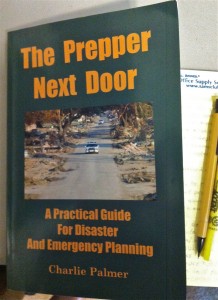 As I reviewed Charlie Palmer’s book, The Prepper Next Door: A Practical Guide For Disaster And Emergency Planning, I kept a notebook and pen beside me and a highlighter in hand. His book contains a lot of good information and I highlighted or wrote down notes about: stuff that I wanted to remember, stuff I knew that I needed to be reminded of, things I thought of while I was reading, and some brand new (to me) ideas. I appreciate that Charlie doesn’t hesitate to recommend products, resources, and websites; there are many I now need to follow-up on and learn more about.
As I reviewed Charlie Palmer’s book, The Prepper Next Door: A Practical Guide For Disaster And Emergency Planning, I kept a notebook and pen beside me and a highlighter in hand. His book contains a lot of good information and I highlighted or wrote down notes about: stuff that I wanted to remember, stuff I knew that I needed to be reminded of, things I thought of while I was reading, and some brand new (to me) ideas. I appreciate that Charlie doesn’t hesitate to recommend products, resources, and websites; there are many I now need to follow-up on and learn more about.
Here’s a sampling of my notes/highlights from his book:
- N95 masks effectively block the H1N1 virus
- purchase masks with air exhalation valves so your glasses don’t fog up
- have back-up water even if you have a well, your well could become contaminated
- add two more 55-gallon rain barrels
- add two more 5-gallon water jugs
- consider rain collection on our greenhouse
- 4 mm plastic sheeting has a variety of uses
- research Katadyn Survivor 35 water filter, it’s expensive but it can desalinate water
- use Pool Shock (calcium hypochlorite) for water purification (store extra for neighbors)
- watch Twilight Zone episode “The Shelter”
- add two more cases of MREs
- look up nitro-pac.com
- research XL50 Maglites (3 AAA) flashlight
- research Tech 40 flashlight
- look up brightbuy.com
- research Sanyo Eneloop rechargeable batteries (we just bought some)
- buy small battery powered (AA or AAA) AM/FM/shortwave radio (consider Eton Mini 300 PE)
- look up NorthernTool.com
- stock up extra spark plugs (can the same ones be used for all vehicles and the generator?)
- look up OBXSOLWIND’s Youtube channel for DIY solar and wind power
- put lithium batteries in flashlights in the cars and BOBs (if they need to be used around the house, substitute rechargeable batteries)
- look up YouTube: The Survival Bookshelf (review of prepper books)
- research Ruger Mark III .22 and Browning Buckmark .22 pistols
- look up gun-test.com for gun reviews (no paid advertisers)
- look up sootch00prepper for gun reviews from a prepper angle
- research ArmaLite AR-10
- consider 20 gauge shotgun for Sarah
- reseach Ruger SP101 (8 shot revolver 22LR)
- research body armor at Youtube channels MrLockandload and CitySurvivalist, and website bulletproofme.com
- to find your home’s security weaknesses, consider how you would break-in to your own home if you had to…
- look up lorextechnology.com for security cameras
- the Bug Out Bag chapter is a great guide on getting started and/or assuring you have everything you’re ‘supposed’ to
- most of his BOV chapter was a learning experience for me; mechanical things (including cars) are not my strength
- The welding part was also interesting; I don’t know anything about welding, but would like to learn
